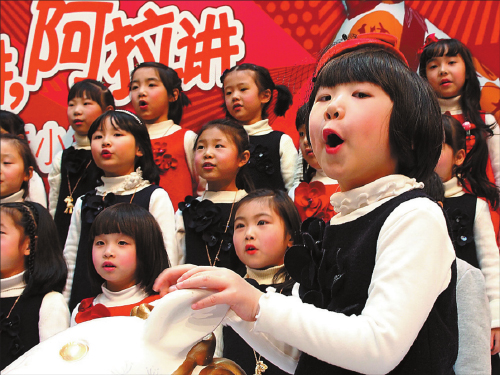
CHEN FEI/XINHUA
Children attend a dialect contest in Shanghai. Many locals have displayed a keen interest in preventing Shanghainese, the local dialect, from being replaced by Mandarin.
'Beijing dialect'
Mandarin, once known as "Beijing dialect", was first selected as China's national language in the 1910's, because of the "Beijing accent being dominant and combining certain elements of other northern and southern dialects." But it wasn't until the late 1940's, with the founding of the People's Republic of China, that Mandarin was designated as "standard" Chinese.
In October 2000, the Law of the People's Republic of China on the Standard Spoken and Written Chinese Language was adopted. It regulated and encouraged the use of Mandarin in the media, education and the public-service industry.
There are about 80 dialects among China's 56 ethnic groups, according to linguist Zhou Youguang. But unlike the less-developed regions and cities, where the population remains stable and the dialect can be passed down through the generations, Shanghai has embraced dreamers and "goldminers", people from other cities who have arrived in hope of making a fortune, from all over the country. That influx has led to the local dialect becoming marginalized.
The protective attitude toward the dialect has caused offence among some new settlers in the metropolis, who argue that its use alienated people from other cities and provinces.
In January, the Shanghai Municipal Education Commission initiated a pilot program to encourage kindergartens in the city to "combine the teaching of the Shanghai dialect in the preschool syllabus". The preferred method involves children learning traditional folk rhymes in the dialect, something the authorities believe will be "less burdensome" for Mandarin-speaking children.
However, the notice sparked controversy and accusations of "elevating a dialect above all other languages". On Sina Weibo, China's Twitter-like social media, the theme "Speaking the Shanghai dialect in kindergartens" has garnered more than 133,000 responses. While natives have given the policy the thumbs up, some non-natives have thumbed their noses at it.
Under the user name "Laobusi1930", one Beijing-based netizen asked whether it is "so important to speak the Shanghai dialect", and saw an aloofness among the Shanghainese-speaking population. "They even speak Shanghainese in other cities simply to show off that they come from Shanghai," as he put it.
"There is, and should be, no conflict between Shanghainese and Mandarin," said Peng Ke, one of the production staff of the TV news program Xinwenfang, which until recently broadcast daily news in the Shanghai dialect
The program, the first to broadcast news reports in the local tongue, is highly popular. Its ratings were far above average after it began broadcasting in Shanghainese in 2012. But the difficulty of synchronizing subtitles led to the reinstatement of Mandarin in October.
"Shanghainese is by no means superior, nor inferior, to any other language. The reason we attach great importance to it is that, as a language, it is on the verge of dying. And it shouldn't, because it's more than just a language," said Peng.
Liu Jianmei, who teaches a Shanghai dialect course for foreign students from Shanghai Tongji University, suggested that to maintain the language, the government should make it a compulsory course in the local school curriculum.
However, despite claim and counterclaim, it may simply be that the language is succumbing to a natural death because some of the younger generation see no value in learning and maintaining it. After all, every year millions of people in Shanghai and the country voluntarily pay several thousand yuan and burn the midnight oil to study, take exams and gain qualifications through programs such as the International English Language Training System and the Test of English as a Foreign Language.
For Yao Ying, a 26-year-old office worker who hails from Zhejiang, the province that neighbors Shanghai, the city's native language offers little of value: "It costs me little if I don't understand Shanghainese. If I have to spend time and money learning a language, I'd rather improve my English, which might increase my chances of landing a better job or even a better life."
COMMON WORDS AND PHRASES
Hello
Mandarin: 你好 (ni hao)
Shanghainese 侬好 (nong hao)
Thank you
M: 谢谢你 (xie xie ni)
S: 霞霞侬 (xia xia nong)
Sorry
M: 对不起 (dui bu qi)
S: 勿好意思 (fa hao yi si)
How much?
M: 多少钱 (duo shao qian)
S: 几钿 (ji di)
Get a cab
M: 叫出租车 (jia chu zu che)
S: 拉差头 (la ca tou)
Goodbye
M: 再见 (zai jian)
S: 再会 (zai hui)
Fantastic/Great/Perfect
M: 好极了 (hao ji le)
S: 嗲 (dia)
Fool
M: 傻瓜 (sha gua)
S: 戆大 (gang du)
I/You/He, She, It
M: 我 (wo)/你 (ni)/他,她,它 (ta)
S: 吾 (wu) 侬 (nong) 伊 (yi)
What's up?
M: 怎么了 (zen me le)
S: 哪能 (na neng)
We recommend:
